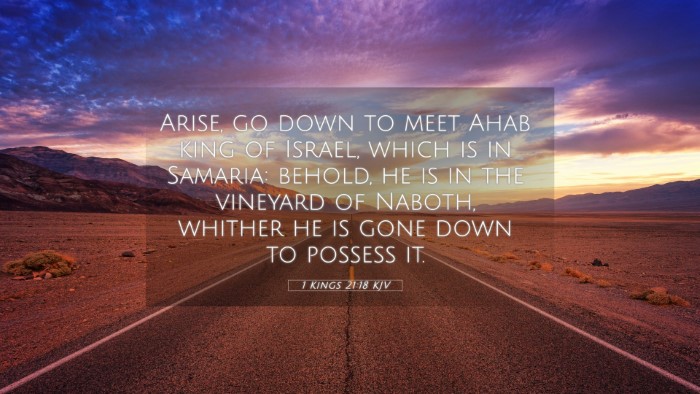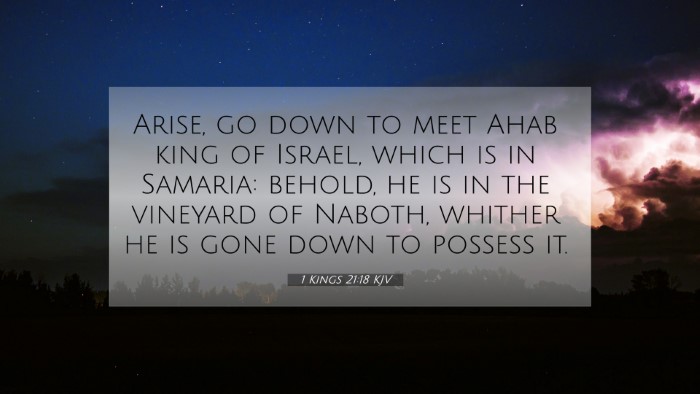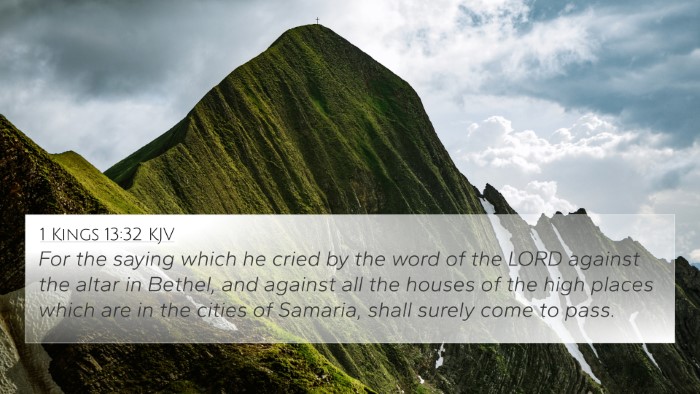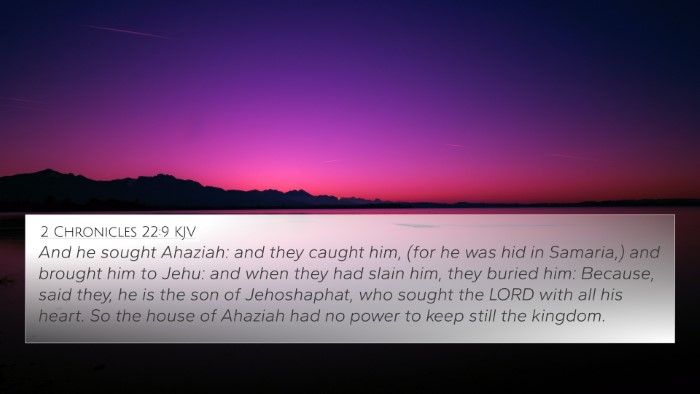Understanding 1 Kings 21:18
1 Kings 21:18 states: "Arise, go down to meet Ahab king of Israel, which is in Samaria: behold, he is in the vineyard of Naboth, whither he is gone down to possess it."
This verse occurs during the confrontation between the prophet Elijah and King Ahab regarding Ahab's acquisition of Naboth's vineyard through immoral means. It serves as a pivotal moment in the narrative, showcasing God's intervention in matters of justice and righteousness.
Commentary Insights
The reflections from public domain commentaries, such as those by Matthew Henry, Albert Barnes, and Adam Clarke, provide a comprehensive understanding of the implication of this verse.
-
Matthew Henry:
Henry emphasizes the gravity of Ahab's actions, noting that the king is not just pursuing personal gain but is engaging in acts of oppression against the innocent. The command given to Elijah to confront Ahab is a direct charge from God meant to bring accountability. Henry draws attention to God’s commitment to justice, even in the face of powerful earthly authorities.
-
Albert Barnes:
Barnes elaborates on the significance of God’s directive to Elijah. He notes that the vineyard represents more than just land; it symbolizes the injustice and infringement on the rights of others. Ahab's greed and entitlement are highlighted, underscoring a moral decay in leadership that God's prophet is called to address. Barnes comments on the idea of divine intervention where God actively unmasks the wickedness of those in power.
-
Adam Clarke:
Clarke reflects on the urgency of the command to Elijah, indicating a need for immediate action. He discusses the implications of Ahab's actions within the broader context of Israel's spiritual decline. Clarke suggests that Ahab's pursuit is a manifestation of idolatry and negligence of the covenant with God. The personal involvement of the prophet signals that God remains active in human affairs, ready to confront injustices directly.
Cross-References
This verse connects to various others that reinforce its themes of justice, accountability, and divine intervention. Here are some key Bible cross-references:
- 2 Samuel 12:1-7: Nathan confronts David over his sin with Bathsheba, paralleling Elijah’s confrontation of Ahab.
- Proverbs 21:15: "It is a joy to the just to do judgment: but destruction shall be to the workers of iniquity." This verse reflects the justice that Elijah seeks to uphold.
- Micah 6:8: "He hath shewed thee, O man, what is good; and what doth the Lord require of thee, but to do justly, and to love mercy, and to walk humbly with thy God?" This scripture complements the call for justice illustrated in 1 Kings 21:18.
- Isaiah 5:8: "Woe unto them that join house to house, that lay field to field, till there be no place, that they may be placed alone in the midst of the earth!" This highlights the sin of greed and injustice that Ahab embodies.
- James 5:17: Relates to God’s power and the role of a prophet, emphasizing prayer and intercession in confronting evil.
- Galatians 6:7: "Be not deceived; God is not mocked: for whatsoever a man soweth, that shall he also reap." Ahab's actions have consequences that echo throughout the scriptures.
- Exodus 20:17: The commandment against coveting, addressing the root of Ahab's desire for Naboth's vineyard.
Thematic Connections
The themes of justice, divine accountability, and prophetic ministry are crucial in 1 Kings 21:18. Not only do they reflect Ahab's personal moral failures, but they also serve as a cautionary tale of how power can corrupt.
This verse not only highlights individual consequences but invites readers to consider the broader implications of justice in society, making connections through scripture that resonate with God’s unchanging character.
Tools for Bible Cross-Referencing
Engaging with passages like 1 Kings 21:18 can be enhanced through various tools for Bible cross-referencing such as:
- Bible concordance for locating themes and topics across texts.
- Bible cross-reference guides that provide structured links.
- Cross-reference Bible study methods for deeper engagement.
- Comprehensive Bible cross-reference materials for thorough study.
Conclusion
In studying 1 Kings 21:18, one uncovers a rich tapestry of themes that link numerous scriptures, providing insight into the nature of God’s justice, the role of prophets, and the moral standings required of leaders. By employing cross-referencing tools, one can find connections that deepen the understanding of scripture and enhance personal faith journeys.




